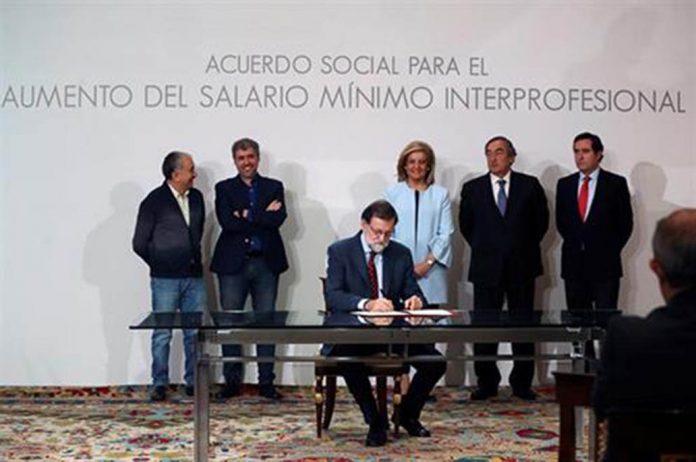Signed on Tuesday at Moncloa Palace by the President of the Government, the presidents of the business organisations CEOE and CEPME, and the general secretaries of the trade unions UGT and CCOO, the agreement represents a 4% increase to the national minimum wage for 2018 and the first step towards reaching the target of 850 euros in 2020.
Signed by the President of the Government, Mariano Rajoy, the Minister for Employment and Social Security, Fátima Báñez, the presidents of CEOE, Juan Rosel, and CEPYME, Antonio Garamendi, and the general secretaries of UGT, Josep María Álvarez, and CCOO, Unai Sordo, the agreement seeks to help “the positive effects of the economic recovery reach everyone”, said Mariano Rajoy. “We don’t want anyone to be left behind and that’s why we’re going to improve wages, starting with the lowest”, he said.
According to estimates, 530,000 people will benefit from this 4% increase to the national minimum wage in 2018, explained the President of the Government, for whom this agreement successfully combines “generosity and responsibility”.
Mariano Rajoy explained that the agreement represents “another step” towards fulfilling the pact reached between the Government of Spain and the Socialist Party to raise the national minimum wage by 8%. The target is to reach 850 euros, almost 12,000 euros a year in 14 payments, by 2020.
This goal, said the President of the Government, is “reasonable and sustainable” because the national minimum wage increase will be maintained provided that economic growth stands at no less than 2.5% and at least 450,000 jobs are created per year. Mariano Rajoy believes that these conditions are “very prudent, because they are below what we are achieving already”. In this regard, he recalled that, since 2014, “we have posted growth in excess of 3% and have created over half a million jobs per year”.
Promoting dialogue
The President of the Government said that there are still over three million Spaniards seeking work and “that should spur us all on – the national government, the regional governments, the local council authorities, the social stakeholders and companies – to keep working together”.
Mariano Rajoy recalled that, during the investiture debate, he made a commitment to bring new momentum to social dialogue and engagement in order to “respond to the situation in which those with the greatest difficulty joining the labour market find themselves: the long-term unemployed, young people and those on the lowest salaries”.
Since then and in collaboration with workers’ and business representatives, whom he thanked for their commitment to this issue, “social dialogue has enabled us to improve the activation for work programme and the extraordinary extension until April of the Prepara Plan”, stressed Mariano Rajoy.
He went on to add that this positive atmosphere of agreements has also led to approval for the Royal Decree-Law on Urgent Measures for the Promotion of the National Youth Guarantee System. These measures enabled 2017 to conclude with over one million young people registered on the Youth Guarantee programme, of which 40% have found work.
Mariano Rajoy concluded his speech by saying that Spain is a “great shared project that improves with everyone’s cooperation” and that everyone is united by “the great goal of reaching 20 million people in work by the end of 2019”.





